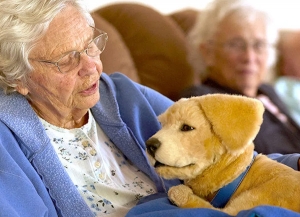Navigating the variety of options for care for an older adult family member can quickly become confusing. Many different names are used to describe the various types of older adult care facilities. In reality, there are just two primary types of elder care: nursing home and assisted living community. Understanding the differences between nursing home and assisted living can make the process of choosing elder care less stressful and more reassuring for all involved.
Elder Care Defined: Nursing Home vs. Assisted Living
A nursing home, also known as a skilled nursing facility (SNF), is permitted to provide extensive nursing and medical, under the supervision of a practicing physician. Nursing homes are equipped to perform near-constant monitoring of individuals who require extensive care due to physical disability, cognitive impairment, and/or unstable chronic health conditions. Depending on the degree of severity and prognosis for recovery, a person’s length of stay at a nursing home can be a short-term (several weeks) or long-term (months or years). For the latter, the nursing home may be referred to as a long-term care (LTC) facility.
Another important distinction is that a nursing home is a custodial arrangement in which the medical staff are the custodians of care for the older adult. In a custodial arrangement, the room to which your loved one is assigned is not their private dwelling. Because nursing homes follow a medical model of custodial care, medical staff and other personnel may enter the room at any time.
Nursing homes provide meals according to medical needs. They may have visitation hours similar to a hospital. Limited social and recreational programs, if any, are provided at a nursing home.
An assisted living community (facility or center) is a term used for a category of elder care known as Continuing Care Retirement Communities (CCRC). Other terms used for CCRC include senior living community and life care communities. These communities are licensed to offer different levels of healthcare and wellness care to support the needs of older adults as their needs change over time, including their physical, medical, social and emotional, and spiritual needs.
Assisted living centers do not employ a custodial arrangement. Rather, the older adult’s dwelling (usually an apartment style set-up) is considered a private residence. Also, assisted living communities embrace a social model, with a focus on preserving well-being and maintaining the older adult’s independence. Assisted living communities uphold a resident’s right to personal privacy, autonomy, and dignity while promoting community and family involvement.
As part of a CCRC, assisted living may be a step within a senior living community that offers a transitional living pathway based on needs. As such, an older adult enters the community as an active and independent resident who needs minimal assistance, but should their health decline in a way that prevents truly independent living, the community provides a transition to stepped-up care. This can include receiving help with daily living activities, physical rehabilitation and adaptations in their same living space—or transitioning to more medically intensive long-term care services such as Memory Care or skilled nursing (with appropriate permits as required by law).
What Type of Care Does a Nursing Home Provide?
Nursing homes, also called skilled nursing facilities (SNF), focus on healthcare and personal care for residents. Primarily, though, nursing home services focus on medical care including:
- nursing care
- 24-hour medical supervision
- basic assistance with activities of daily living (ADLs) (ex: personal hygiene, toileting, dressing, cleanliness of living space and others)
- physical rehabilitation such as post-surgery
- speech therapy
- social-emotional therapeutic services.
Some older adults will stay at a nursing home for a short time after being in the hospital. After they recover, they go home. However, most nursing home residents live there permanently because they have ongoing physical or mental conditions that require constant care and supervision.
What Type of Care Does Assisted Living Provide?
Assisted living facilities can be transformative environments for aging adults. With a focus on wellbeing, supporting independence, and expanding social engagement, older adults residing in assisted living communities can forge new friendships with people their age, discover new hobbies, become more active, preserve cognitive function, and enjoy amenities that would be harder for them to access if they remained in a traditional home or in the care of a family member.
All residents who reside within an assisted living community are considered independent to the extent that they are capable of participating in or at least partially maintaining their basic daily activity needs within their private living quarters. The extent of assistance needed is a determining factor in cost to reside at an assisted living community.
Other daily services that assisted living provides – if and when needed by a resident can include:
- Meals provided and/or restaurants on site
- Recreational areas indoors and out
- Entertainment and enrichment programs
- Concierge services
- Shared common areas for activities
- 24-hour medical staff accessible to all residents regardless of level of independence
- Personal hygiene assistance (dressing, bathing)
- Medication reminders
- Housekeeping
- Laundry
- Transportation
- Security
As an assisted living “continuum of care” community, Everbrook Senior Living offers a wide variety of services, amenities, and living options to help older adult residents remain independent and thriving for as long as possible.
To sum it all up, nursing homes focus on medical care—from short-term rehab to long-term ongoing medical care. Assisted living is focused on supporting the wellness needs of older adult residents for the duration of their “golden years”.
Does My Elderly Family Member Need Nursing Home Care or Assisted Living?
Deciding if an elderly family member is better served by nursing home care or assisted living is a complex process. Foremost, this decision will be determined by your elderly family member’s medical needs and the extent to which you can provide what they need for the person to remain at home. Other factors will include the extent of their physical or cognitive impairment, medication management, and prognosis. You’ll also want to consider if their condition is likely to worsen over time, which means the care they need now will change in months or years.
Even an older adult who is mostly independent in their self-care, today, will encounter times when their healthcare needs become too extensive for living on their own, even within an assisted living community. This is why you want to choose an older adult community like Everbrook Senior Living, which provides transitional care to support your loved one as their health and wellbeing changes over time. It is much less stressful and easier for an older adult to adapt to changes in continuum of care when it is provided within the same residential setting than to have to move from one facility to another as level of care changes.
Resources
CT Assisted Living Association Resource Guide
https://everbrookseniorliving.com/images/forms/CALA-Consumer-Guide.pdf
Everbrook’s FAQs (again they reference CT in many of these responses so not sure about other states)
https://everbrookseniorliving.com/resources/frequently-asked-questions
Assited Living at Everbrook Communities
Assited Living v. Nursing Home: How do they Differ? https://www.healthline.com/health/assisted-living-vs-nursing-home
Residential Facilities, Assisted Living, and Nursing Homes https://www.nia.nih.gov/health/residential-facilities-assisted-living-and-nursing-homes
Helpful Guidance for Managing Older Adult Long-Term Care
Centers for Medicare & Medicaid Services
800-633-4227
877-486-2048 (TTY)
Eldercare Locator
800-677-1116
This email address is being protected from spambots. You need JavaScript enabled to view it.
USAging
202-872-0888
This email address is being protected from spambots. You need JavaScript enabled to view it.
You can also call your local Area Agency on Aging or Department of Human Services.













